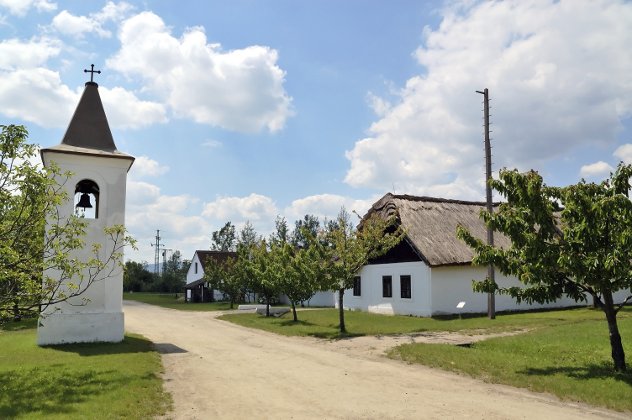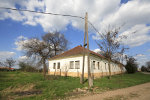Buying farmland, tanya’s and wine houses in Hungary
Robert Kemkers, Saturday, 2 July 2016

Author: Robert Kemkers, .
Translated by Jos Deuling,
Purchases on the vineyard. Simplified procedure in 2016.
In the winter issue of 2013 I wrote extensively on the amendments by May 1, 2014, making it possible for many Europeans to buy farmland and wine houses. The procedure is very cumbersome, but as I already predicted, it would be simplified for orchards, vineyards and wine houses. That’s been the case! But hurry, because the particular procedure that allows this only applies until the end of 2016.
Belterület, külterület and zártkert
Let's first define what is at stake. According to the cadastre, all the property in Hungary is divided into three categories: 'belterület (in urban areas), külterület (outside urban areas) and ‘zártkert’. The latter is a kind of intermediate class that shares certain characteristics of the area "inside" and located "outside" of the urban areas. Thus, the area usually located right at the edge of, or manifestly outside town or city, the plots are formally part of the rural (and they have an agricultural value), and the municipality is not required to harden the streets or provide public utilities. By contrast, it is allowed use to place a building on a part of the plot and several municipalities allow permanent residence and registration if the building meets certain standards. In practice, this concerns in particular areas of the town with vineyards, orchards or summer cottages.
Cadastral sheet decisive
The Cadastral sheet always clearly indicates into which category a lot falls. Apart from possible differences between Zoning and Cadastre, it is usually quite clear into which category an object falls. The Cadastral sheet is decisive! Only if the Zoning includes a particular area or field in the urban area, it is possible to transfer a plot to the "inner area", where one usually is allowed to build more. Until recently, this transfer was the only possibility for foreigners to buy a plot in the 'zártkert’. Gradually the legislation has been tightened, and municipalities are reluctant to enlarge the Zoning any further because this also entails a lot of additional obligations for the infrastructure. Also, they don't want to sacrifice nature as long as there are sufficient opportunities within the existing Zoning.
Value in Gold Crowns
Because of the lower land prices, free space and a location close to nature, wine houses and cottages on a vineyard are popular with many foreigners. Because almost all of the land in the 'zártkert’ formally has an agricultural destination, with a value in so-called ‘Golden Crowns’ (‘AK’), the same restrictions applied as for other agricultural lands outside urban areas: foreigners could not buy them. We found out that several compatriots nevertheless have bought wine houses, vineyards, and orchards but that in the name of a Hungarian acquaintance.
Up to 1 hectare
Most of the constructions were illegal and since mid-2014 all usufructs and wills to 'strangers' are revoked, and it’s not possible anymore to register new mortgages on agricultural parcels. As of May 1, 2014, the law changed: both Hungarians and foreigners can now buy agricultural land (including the 'zártkert’), but there is a maximum of one hectare in total per person. Only officially registered farmers can buy more. The procedure for purchasing a plot of less than 1 hectare is very complicated and time-consuming because there is a very comprehensive system of pre-emptive rights: in practice, for small plots on the 'zártkert' the procedure takes a year and often longer. There are relatively large costs involved.
Cancel agricultural use
In respond to a lot of complaints, the legislation is amended at the end of 2015. As of December 1, 2015, you can request the cadastre to cancel the agricultural use of one or more lots on the 'zártkert'; this does not apply to objects outside the zoning, including the so-called ‘Tanya's'! Cancellation is possible if the land is no longer used for agriculture, but used as a 'garden' or 'yard' of your wine- or holiday home. This cancellation is in principle forever and can not be easily undone. It is also not eligible for agricultural subsidies. The result is not to bring the plot to the urban area, but only the removal of the agricultural use and the elimination of the long sale process with preferential rights. The plot remains part of the 'zártkert’, but the definition will change to ‘zártkerti művelés Alol Kivett terület’, which means ‘land of the wine hills/allotments which has been withdrawn from agricultural use. The opportunities to build or other provisions in the zoning remain unchanged but there is no maximum to the area which can be bought. And there may be a simple, quick sale procedure to be followed, without right of the first refusal, i.e., in the same way as with an object within the urban area.
Free ... this year
The agricultural value should be surrendered, but in 2016 the procedure is free, even free of charges. But watch out! This extension is only temporarily, until 31-12-2016! After that date, the 'old rules' apply again, including the long sale process. I advise all readers who own property within the 'zártkert' and are not a professional wine grower to use this temporary widening of the rules. The forms to start this procedure are in Hungarian. They must be signed and submitted on behalf of all officially registered owners. An attorney or lawyer is not required in this case, but you should hire one as the text on the form require a good command of Hungarian and the legal rules. The amendment procedure varies in practice from two weeks to a month or two. After the adjustment the property can be transferred to the actual users, or to a new buyer. Readers with questions or who want to start this procedure may contact the undersigned.

Author: Robert Kemkers, .
Translated by Jos Deuling,
Purchases on the vineyard. Simplified procedure in 2016.
In the winter issue of 2013 I wrote extensively on the amendments by May 1, 2014, making it possible for many Europeans to buy farmland and wine houses. The procedure is very cumbersome, but as I already predicted, it would be simplified for orchards, vineyards and wine houses. That’s been the case! But hurry, because the particular procedure that allows this only applies until the end of 2016.
Belterület, külterület and zártkert
Let's first define what is at stake. According to the cadastre, all the property in Hungary is divided into three categories: 'belterület (in urban areas), külterület (outside urban areas) and ‘zártkert’. The latter is a kind of intermediate class that shares certain characteristics of the area "inside" and located "outside" of the urban areas. Thus, the area usually located right at the edge of, or manifestly outside town or city, the plots are formally part of the rural (and they have an agricultural value), and the municipality is not required to harden the streets or provide public utilities. By contrast, it is allowed use to place a building on a part of the plot and several municipalities allow permanent residence and registration if the building meets certain standards. In practice, this concerns in particular areas of the town with vineyards, orchards or summer cottages.
Cadastral sheet decisive
The Cadastral sheet always clearly indicates into which category a lot falls. Apart from possible differences between Zoning and Cadastre, it is usually quite clear into which category an object falls. The Cadastral sheet is decisive! Only if the Zoning includes a particular area or field in the urban area, it is possible to transfer a plot to the "inner area", where one usually is allowed to build more. Until recently, this transfer was the only possibility for foreigners to buy a plot in the 'zártkert’. Gradually the legislation has been tightened, and municipalities are reluctant to enlarge the Zoning any further because this also entails a lot of additional obligations for the infrastructure. Also, they don't want to sacrifice nature as long as there are sufficient opportunities within the existing Zoning.
Value in Gold Crowns
Because of the lower land prices, free space and a location close to nature, wine houses and cottages on a vineyard are popular with many foreigners. Because almost all of the land in the 'zártkert’ formally has an agricultural destination, with a value in so-called ‘Golden Crowns’ (‘AK’), the same restrictions applied as for other agricultural lands outside urban areas: foreigners could not buy them. We found out that several compatriots nevertheless have bought wine houses, vineyards, and orchards but that in the name of a Hungarian acquaintance.
Up to 1 hectare
Most of the constructions were illegal and since mid-2014 all usufructs and wills to 'strangers' are revoked, and it’s not possible anymore to register new mortgages on agricultural parcels. As of May 1, 2014, the law changed: both Hungarians and foreigners can now buy agricultural land (including the 'zártkert’), but there is a maximum of one hectare in total per person. Only officially registered farmers can buy more. The procedure for purchasing a plot of less than 1 hectare is very complicated and time-consuming because there is a very comprehensive system of pre-emptive rights: in practice, for small plots on the 'zártkert' the procedure takes a year and often longer. There are relatively large costs involved.
Cancel agricultural use
In respond to a lot of complaints, the legislation is amended at the end of 2015. As of December 1, 2015, you can request the cadastre to cancel the agricultural use of one or more lots on the 'zártkert'; this does not apply to objects outside the zoning, including the so-called ‘Tanya's'! Cancellation is possible if the land is no longer used for agriculture, but used as a 'garden' or 'yard' of your wine- or holiday home. This cancellation is in principle forever and can not be easily undone. It is also not eligible for agricultural subsidies. The result is not to bring the plot to the urban area, but only the removal of the agricultural use and the elimination of the long sale process with preferential rights. The plot remains part of the 'zártkert’, but the definition will change to ‘zártkerti művelés Alol Kivett terület’, which means ‘land of the wine hills/allotments which has been withdrawn from agricultural use. The opportunities to build or other provisions in the zoning remain unchanged but there is no maximum to the area which can be bought. And there may be a simple, quick sale procedure to be followed, without right of the first refusal, i.e., in the same way as with an object within the urban area.
Free ... this year
The agricultural value should be surrendered, but in 2016 the procedure is free, even free of charges. But watch out! This extension is only temporarily, until 31-12-2016! After that date, the 'old rules' apply again, including the long sale process. I advise all readers who own property within the 'zártkert' and are not a professional wine grower to use this temporary widening of the rules. The forms to start this procedure are in Hungarian. They must be signed and submitted on behalf of all officially registered owners. An attorney or lawyer is not required in this case, but you should hire one as the text on the form require a good command of Hungarian and the legal rules. The amendment procedure varies in practice from two weeks to a month or two. After the adjustment the property can be transferred to the actual users, or to a new buyer. Readers with questions or who want to start this procedure may contact the undersigned.

Second homes, renovation objects and holiday homes for sale in Hungary. For sale by owner and agents. Properties at Lake Balaton, in Pecs and many other regions.
 Hungarian-English dictionary of real estate terms in Hungary. What is for example a Családi ház, Ingó zálog, Nyaraló or Lakáshitel? What does Ingatlan,
Vagyonadó or Lakóingatlan mean?
Hungarian-English dictionary of real estate terms in Hungary. What is for example a Családi ház, Ingó zálog, Nyaraló or Lakáshitel? What does Ingatlan,
Vagyonadó or Lakóingatlan mean?
More articles
